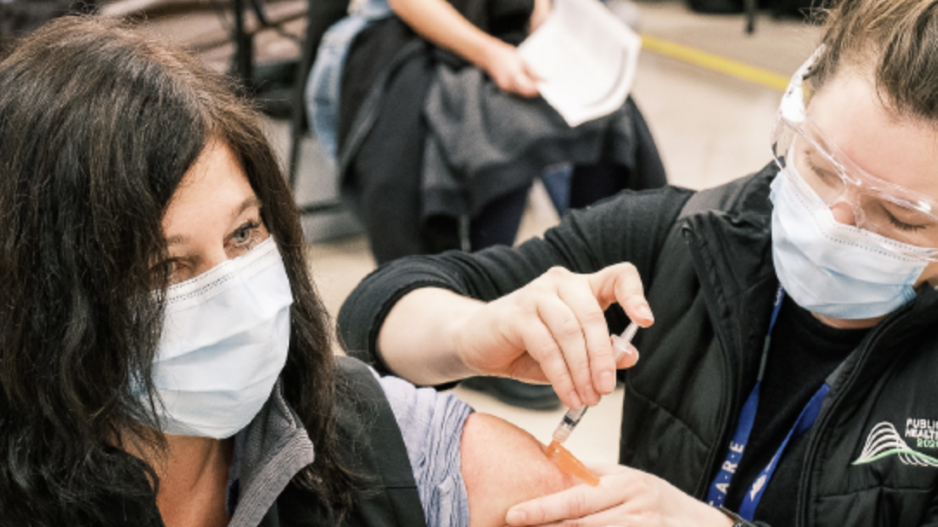Most British Columbians will still have to wait until early 2022 to get their third COVID-19 vaccine shot even as the global emergence of the Omicron variant raises concerns over the efficacy of just two vaccine doses.
Provincial officials confirmed Tuesday during an unattributed technical briefing that 610,264 booster doses have been administered to date in the province of about five million people.
As the U.K. embarks on a campaign to administer about one million booster doses daily to mitigate against the newly identified Omicron variant, B.C.’s efforts remain focused on prioritizing vaccine recipients based on age and vulnerability.
But B.C. officials said the province expects to administer 350,000 more booster doses than initially planned by year’s end after beginning its booster campaign in September.
Those initial efforts were zeroing in on higher-risk populations such as those ages 70 years and older, Indigenous populations in rural locations, residents in long-term-care and assisted-living, the immunosuppressed and health-care workers who received their initial two doses at a shorter interval than the general population. They have since expanded to some younger age brackets.
But booster doses for the bulk of the general population are not expected to be administered until January or February, provincial officials said Tuesday.
This comes as the federal government has been trying to mitigate against the spread of the Omicron variant — considered to be more transmissible than the dominant Delta variant — through increased border restrictions and COVID-19 testing at airports.
Vancouver International Airport was administering 2,080 tests daily as of November 30 but that has since ramped up to 3,130 tests administered daily as of December 9.
Provincial officials, meanwhile, said part of B.C.’s own booster ramp-up includes tapping 500 pharmacies across the province to administer boosters after most mass vaccination clinics closed in the past few months.
The booster campaign comes as the province also just embarked on administering first doses to children ages five to 11. So far the province has administered 73,457 doses to children in this age group, while 146,426 have registered and 127,976 have booked appointments.
Provincial health officer Dr. Bonnie Henry urged British Columbians to get vaccinated after unveiling data showing 78% of COVID-19 patients in critical care are unvaccinated.
“It’s important as we head into this uncertainty that is a new strain,” she said in a briefing to the public Tuesday afternoon.
Henry said it’s too early to say if or when the Omicron variant will become the dominant variant in B.C., noting community transmission is less in this province than Ontario.
Health Minister Adrian Dix, speaking at the same afternoon briefing, also cautioned British Columbians against submitting fraudulent vaccine records to the provincial immunization registry. The province will be sending letters to 1,715 people who’ve submitted records “without successful uploads,” according to Dix. He added records suspected of being fraudulent will be forwarded to law enforcement.
Earlier this month, the National Advisory Committee on Immunization (NACI) said it “strongly recommends” boosters are offered at least six months after a second dose for those 50 or older, long-term care home residents, Indigenous people and those who received two doses of the AstraZeneca plc rather than the mRNA products.
B.C. health officials committed in October to making third doses available to British Columbians who received their second doses at least six to eight months prior.
Provincial officials said Tuesday part of the reasoning for sticking to the January-February road map is so that boosters are administered at a long enough interval to provide maximum protection rather than shorter intervals between doses that would reduce protection against COVID-19 and its variants.
Meanwhile, Henry said the province is considering the possibility of requiring vaccination cards for smaller events — not just those with 50 or more people.
“We should not be having large parties where we’re coming together indoors, particularly with people we don’t know their vaccination status,” she said.
“We know that that’s going to be even more of a risk with overcrowding as we go into this holiday period.”
Henry also let it drop that the B.C. vaccine card program will likely be in place beyond January, when it was originally set to expire. The province had stated in the lead-up to the vaccine card’s introduction in September that it would leave the door open to renewing it beyond January if need be.




